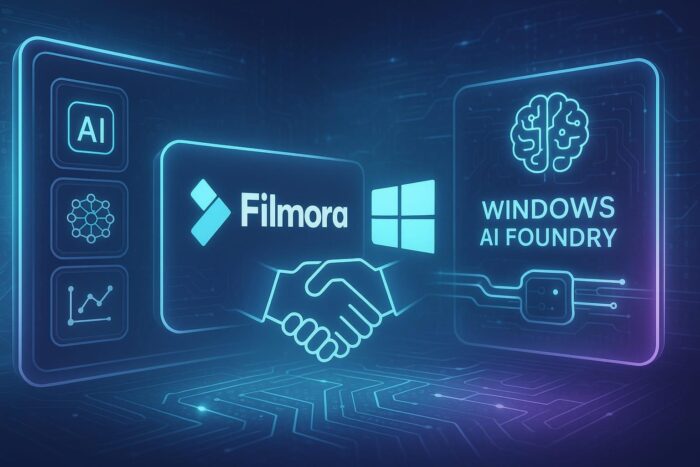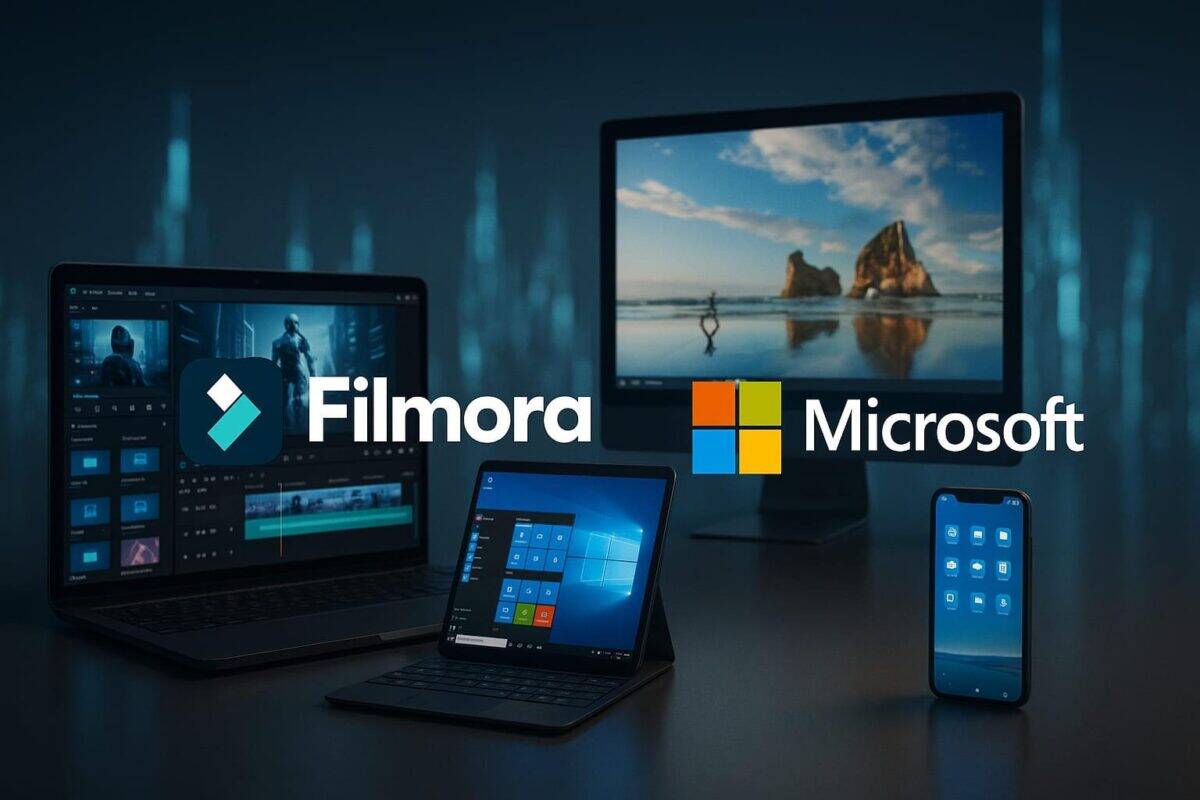One Codebase to Rule Them All: Filmora Reimagines Cross-Platform Video Editing with Windows ML
7 min. read
Published on
Read our disclosure page to find out how can you help MSPoweruser sustain the editorial team Read more

When it comes to video editing, staying ahead of all major technological advancements is crucial. Filmora has taken a significant step forward by integrating Windows Machine Learning into its platform. This collaboration enables Filmora to support a unified installer that effortlessly adapts to Intel, AMD, and Qualcomm processors.
Developers used to face the challenge of creating separate versions of their software for each processor type, a process that could take months. With the new unified approach, Filmora has drastically reduced this time to achieve near-instant deployment across all major chip platforms. Leveraging Windows ML lets it showcase its commitment to innovation and strong integration within the Microsoft ecosystem.
The Fragmented Chip Landscape of Modern PCs
Within the computing world, users encounter a variety of processors powering their devices. These processors are primarily from Intel, AMD, and Qualcomm. Each of these brings distinct architectures and features to the table.
- Intel: It dominates the traditional PC market, offering processors known for their strong performance and broad software compatibility.
- AMD: Gaining significant traction, it is especially common among gamers and professionals. Much of that is due to its valued Ryzen series, which is noted for its competitive performance.
- Qualcomm: Well-known for its smartphone chips, it has now entered the PC market with its Snapdragon processors. The high emphasis on energy efficiency and always-on connectivity is its core tenet.
This diversity kind of results in a lot of challenges despite being beneficial. Software developers often need to create multiple iterations of their apps to ensure compatibility across these different processors. Not to forget that it can consume a lot of valuable time and resources.
Yet, advancements in tech are paving the way for much more unified solutions. Innovations like Microsoft’s Windows Machine Learning let apps run efficiently across various hardware platforms without needing separate versions. Such developments promise a more streamlined experience for both developers and end-users.
How Windows ML Empowers Cross-Platform Compatibility
As mentioned, software developers faced the daunting task of creating separate versions of their apps to accommodate the varying architectures of processors. Apart from taking too much time and resources, it often delays deployment and increases maintenance efforts. Therefore, you have to explore Windows Machine Learning, a transformative solution that addresses these challenges head-on.
It serves as a unifying framework that abstracts the underlying hardware differences. That allows developers to write code once and have it run effortlessly across multiple processor types. This feat is achieved through the use of execution providers. These EPs act as intermediaries between the application and the hardware, optimizing performance for each specific platform.
As a result, developers no longer need to package separate AI runtimes or drivers with their apps. Moreover, Windows ML is designed to be forward-compatible. That means it automatically adapts to new hardware advancements without requiring changes to the application code. It guarantees that apps remain working and optimized, even if new processors enter the market.
For users, this fact translates to a more streamlined experience. Applications leveraging Windows ML can be installed without the need to identify or select the appropriate version for their specific hardware. The reason is that the system handles compatibility behind the scenes.
Filmora’s Implementation Path to Unified Support
Filmora has consistently sought to simplify and enhance the experience in the dynamic realm of video editing. It fully recognizes the challenges posed by the diverse range of PC processors. The program has embarked on a mission to streamline its software deployment across these platforms.
Traditionally, supporting multiple processor architectures required developing and maintaining separate versions. That often led to delays in delivering user updates and features on different hardware configurations.

In a comprehensive approach to fixing this dilemma, Filmora integrated Microsoft’s Windows ML into its development framework. This strategic move allowed it to adopt a single codebase that intelligently adapts to the underlying hardware of the user’s device. By leveraging Windows ML’s execution providers, Filmora ensures that its application runs efficiently on Intel, AMD, and Qualcomm systems without the need for separate versions.
The implementation of this unified approach has yielded significant benefits. Development cycles have been shortened to enable faster deployment of updates and features. Users now get to enjoy an effortless installation experience, free from all sorts of headaches from trying to find the correct version. Not to overstate the fact that this integration underscores Filmora’s commitment to innovation and ability to adapt to the evolving technological landscape.
A Win-Win: Developer Efficiency Meets Seamless User Experience
Regarding software development, perfect compatibility across various hardware platforms is a tough task. Most developers often have to create and maintain separate versions of apps to cater to different processor architectures. That often leads to extended development cycles and increased resource allocation.
The great news is that this landscape is undergoing a transformative shift. It has primarily to do with the advent of Windows Machine Learning. Providing a unified framework that abstracts the underlying hardware differences, it lets developers write code once. Then, they can run it effortlessly across multiple processor types without a hitch. This approach means a lot of reduction in the time and effort required to bring apps to market.
Such tech advancement also results in a much more streamlined experience for users. Apps leveraging Windows ML can be installed without the need to identify or select the appropriate version. Instead, the system handles compatibility behind the scenes. Notably, it reduces installation complexity significantly and ensures optimal performance across a wide range of devices.
Embracing Windows ML means developers get to focus more on innovation and less on compatibility issues. At the same time, users benefit a lot from faster access to apps and a consistent experience across platforms. This synergy between developer efficiency and user satisfaction underscores the significant impact of Windows ML in software development.
Future Collaboration with the Microsoft Ecosystem
Looking ahead, Filmora’s collaboration positions it to leverage emerging advancements within the Microsoft ecosystem. These upcoming developments, especially in AI and machine learning, are expected to play an important role in enhancing Filmora’s capabilities in the near future. Microsoft’s introduction of the Windows AI Foundry and support for the Model Context Protocol aims to enhance AI integration across Windows apps. That facilitates much more intuitive and automated functionalities.
By aligning with these developments, Filmora can further streamline its video editing capabilities. It can ensure compatibility and optimized performance across diverse hardware platforms. This strategic partnership shows Filmora’s commitment to innovation and its adaptability within the evolving technological landscape.
As the Microsoft ecosystem continues to evolve, Filmora’s integration with tools like Windows ML will prove a major milestone. Plus, its participation in initiatives like the Windows AI Foundry will be instrumental in delivering enhanced user experiences. Furthermore, these innovations will help maintain its competitive edge in the video editing industry.

Conclusion
In summary, Filmora’s innovative use of Windows ML has reshaped how video editing software can adapt to the diverse world of PC processors. Embracing a single codebase means it effortlessly works across Intel, AMD, and Qualcomm chips. Filmora has significantly reduced development time and eliminated the need for separate versions, simplifying everything for both developers and users.
This strategic move highlights Filmora’s technical expertise and smooth integration with the Microsoft ecosystem. It also promises a future where compatibility issues become a thing of the past. As Filmora continues to collaborate closely with Microsoft and embrace new advancements like the Windows AI Foundry, users can expect even more powerful features.
About Wondershare Technology
Wondershare is a globally recognized software company founded in 2003, known for its innovative solutions in creativity and productivity. Driven by the mission “Creativity Simplified”, Wondershare offers a range of tools, including Filmora, Virbo, and DemoCreator for video editing; PDFelement for document management; EdrawMax, EdrawMind for diagramming; and SelfyzAI, Pixpic, FaceHub for image recovery and editing. With over 1.5 billion users across 200+ countries and regions, Wondershare empowers the next generation of creators with intuitive software and trendy creative resources, continually expanding the possibilities of creativity worldwide.








User forum
0 messages